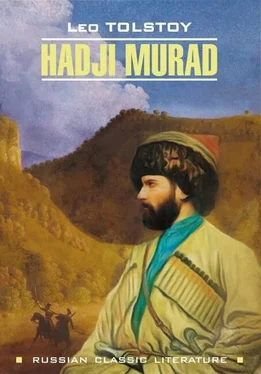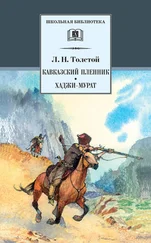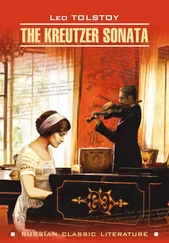“Go on, tell me another one,” said Marya Dmitrievna, smiling.
“It’s not a joke. It’s true. They are just outside.”
“What? Really?” said Marya Dmitrievna.
Why should I want to make it up? Go and look – they are just outside.
“Well, there’s a thing!” said Marya Dmitrievna, rolling down her sleeves and feeling for the pins in her thick plait of hair. “I’ll go and wake up Ivan Matvcovich, then!”
“No, I’ll go. You, Bondarenko, go and open the door,” said Butler.
“That’s all right by me,” said Marya Dmitrievna and returned to her work.
When he learnt that Hadji Murad had arrived, Petrov, who had heard already that he was in Grozny, was not in the least surprised. He sat up in bed, rolled a cigarette, lit it, and began to get dressed, loudly coughing to clear his throat and grumbling at the higher-ups who had sent ‘that devil’ to him. When he was dressed, he ordered his batman to bring his ‘medicine, and the batman, knowing what he meant, brought him some vodka.
“You should never mix your drinks,” he growled, drinking the vodka and eating a piece of black bread with it. “I was drinking chikhir last night and now I’ve got a thick head. All right, I’m ready,” he said finally and went into the parlor, where Butler had taken Hadji Murad and the escorting officer.
The officer handed Ivan Matveevich the orders from the commander of the Left Flank in which he was instructed to take charge of Hadji Murad and, while allowing him contact with the mountaineers through scouts, to ensure that he never left the fort except with an escort of Cossacks.
Ivan Matveevich read the paper, looked hard at Hadji Murad, and studied the paper again. After several times shifting his gaze from the paper to his visitor, he finally fixed his eyes on Hadji Murad and said:
“Yakshi, bek-yakshi. Very well. Let him stay then. But you tell him that my orders are not to let him loose. And orders are orders. As to quarters, what do you think, Butler? We could put him in the office.”
Before Butler could reply, Marya Dmitrievna, who had come from the kitchen and was standing in the doorway, said to Ivan Matveevich:
“Why in the office? Let him stay here. We can give him the guest-room and the store-room. At least he’ll be where you can keep an eye on him,” she said. she glanced at Hadji Murad, but meeting his eyes turned hurriedly away.
“Yes, I think Marya Dmitrievna is right,” said Butler.
“Go on, off ”with you!” said Ivan Matveevich, frowning “Womenfolk have no business here.”
Throughout this conversation Hadji Murad sat with his hand behind the handle of his dagger and a faintly disdainful smile on his lips. He said it mattered nothing where he lived. All he needed was what the sardar had granted – to have contact with the mountaineers, and he wished therefore that they be allowed access to him. Ivan Matveevich said that this would be done and asked Butler to look after their guests while something to eat was brought and the rooms made ready. He would go to the office to fill in the necessary papers and give the necessary instructions.
Hadji Murat’s relations with these new acquaintances immediately became very clearly established. From their first meeting Hadji Murat felt nothing but repugnance and scorn for Ivan Matveevich and was always haughty in his treatment of him. He particularly liked Marya Dn1itrievna, who cooked and served his food. He liked her simple manner, her particular, for him foreign, type of beauty, and the unconsciously conveyed attraction which she felt for him. He tried not to look at her, or to speak to her, but his eyes turned automatically towards her and followed her movements.
With Butler he struck up an immediate friendship and took pleasure in the long talks he had with him, asking Butler about his life and telling him of his own, passing on the news brought by the scouts about the situation of his family and even asking his advice as to what he should do.
The news brought by the scouts was not good. In the four days he had been at the fort they had come twice and on both occasions the news was bad.
Shortly after Hadji Murad’s surrender to the Russians his family was taken to the village of Vedeno and kept there under guard waiting for Shamil to decide their fate. The women – Hadji Murad’s old mother Patimat and his two wives – together with their five small children lived under guard in the house of Ibrahim Rashid, one of Shamil’s captains; Yusuf, his eighteen-year-old son, was kept in a dungeon, a deep pit dug eight or nine feet into the ground, with four criminals who, like him, were awaiting Shamil’s decision on their fate.
But no decision came, because Shamil was away campaigning against the Russians.
On 6 January 1852, Shamil returned home to Vedeno after a battle with the Russians in which, according to the Russians, he had been beaten and fled to Vedeno, but in which, according to the view of Shamil and all his murids, he had been victorious and put the Russians to flight. In this engagement and it happened very rarely – he himself had fired his rifle and with drawn sword would have charged straight at the Russians if his escort of murids had not held him back. Two of them were killed at his side.
It was midday when Shamil arrived at his destination, surrounded by his party of murids showing of their horsemanship, firing rifles and pistols and chanting endlessly “La ilaha illa allah.”
All the people of Vedeno, which was a large village, were standing in the street and on the roofs of the houses to greet their master, and they too celebrated the event with musket and pistol fire. Shamil rode on a white Arab, which merrily sought to have its head as they neared home. The horse’s harness was extremely plain with no gold or silver ornament a red leather bridle, finely made and grooved down the middle, metal bucket stirrups and a red shabrack showing from under the saddle. The Imam wore a fur coat overlaid with brown cloth, the black fur projecting at the collar and cuffs; it was drawn tight about his tall, slim frame by a black leather strap with a dagger attached to it. On his head he wore a tall, flattopped papakha with a black tassel and white turban round it, the end of which hung below his neck. On his feet were green soft leather boots and his legs were covered with tight black leggings edged with plain lace.
The Iman wore nothing at all that glittered, no gold or silver, and his tall, erect, powerful figure in its plain clothes in the midst of the murids with their gold-and silver-ornamented dress and weapons, created on the people exactly the impression of grandeur which he desired and knew how to create His pale face, framed by his trimmed red beard, with its small, constantly screwed up eyes, wore a fixed expression as if made of stone. Passing through the village he felt thousands of eyes turned on him, but his own eyes looked at no one. The wives and children of Hadji Murad went on to the verandah with the other occupants of the house to watch the Imam’s entry. Only Patimat, Hadji Murad’s old mother, did not go, but remained sitting as she was on the floor of the house with her grey hair disheveled and her long arms clasped round her thin knees, while she blinked her fiery black eyes and watched the logs burning down in the fireplace. She, like her son, had always hated Shamil, now more than ever, and had no wish to see him.
Hadji Murad’s son also saw nothing of Shamil’s triumphal entry. From his dark fetid pit he could only hear the shots and chanting and he experienced such anguish as is only felt by young men, full of life, when deprived of their freedom. Sitting in the stinking pit and seeing only the same wretched, filthy, emaciated creatures he was confined with, who mostly hated one another, he was overcome by a passionate envy for people who had air and light and freedom and were at this moment prancing round their leader on dashing horses and shooting and chanting in chorus “La ilaha illa allah.”
Читать дальше
Конец ознакомительного отрывка
Купить книгу












